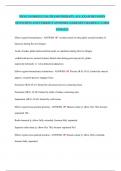MUSCULOSKELETAL PHYSIOTHERAPY. ALL EXAM REVISION
QUESTIONS AND CORRECT ANSWERS (ALREADY GRADED A+) (2024
UPDATE)
Elbow region biomechanics - ANSWER- -trochlea notch of ulna glides around trochlea of
humerus during flex/ext (hinge)
-head of radius glides backwards/forwards on capitulum during flex/ext (hinge)
-radial head moves around (rotates) lateral ulna during pron/sup (pivot), glides
superiorly/inferiorly w/ wrist abduction/adduction
Elbow region biomechanics limitations - ANSWER- Flexion (R-H, H-U): limited by muscle
approx: coronoid process engages fossa
Extension (R-H, H-U): limited by olecranon process contacting fossa
Pronation (SR-U, R-H): limited by shaft of radius contacting ulna
Supination (SR-U, R-H): limited by soft tissues
Elbow region loose-packed position - ANSWER- Humero-ulnar jt: elbow flex 70d, forearm
supinated 10d
Radio-humeral jt: elbow fully extended, forearm fully supinated
Superior radio-ulnar jt: elbow flex 70d, forearm supinated 45d
Elbow region close-packed position - ANSWER- Humero-ulnar jt: elbow fully extended,
forearm fully supinated
,Radio-humeral jt: elbow flexed 90d, forearm supinated 5d
Superior radio-ulnar jt: forearm supinated 5d
Elbow disorders extrinsic causes - ANSWER- referred pain from:
-cervical spine pathology, somatic & radicular (common)
-shoulder disorders (e.g. Early adhesive capsulitis)
-wrist conditions (e.g. Carpal tunnel syndrome)
Elbow disorders intrinsic causes - ANSWER- -Soft tissue lesions: lateral & medial
epicondylalgia, tendinopathy-bicipital & triceps
-Joint disorders: pulled elbow, olecranon bursitis, loose bodies
-Peripheral nerve entrapments: ulnar, median, radial
Soft tissue lesions, lateral epicondylalgia - ANSWER- -pain over lateral elbow + or - extensor
aspect forearm
-AKA tennis elbow, epicondylitis
-overuse injury of extensor origin w/ degeneration: may lead to chronicity
-structures may include: Extensor Carpi Radialis Brevis attachment, radial nerve, radiohumeral
joint, bursae
-usually dominant arm
-sudden or gradual onset
-occupation/sport involves gripping
,-occasionally due to direct blow
Lateral Epicondylalgia - ANSWER- -pain on writing, gripping
-pain reproduced by: resisted wrist ext or radial deviation, resisted finger ext
Lateral Epicondylalgia examination - ANSWER- -Local palpation tender: lateral epicondyle,
extensor muscles, radiohumeral joint line, radial nerve
-Stretch of forearm extensors painful: wrist flex, elbow ext, forearm pronation
Lateral epicondylalgia treatment - ANSWER- Physiotherapy: activity modification &
education, exercise: eccentric, isometric, concentric. Friction massage, joint mobilisation esp
Mobilisation w/ movement (MWM), neural mobilisation, EPA, counterforce brace, taping
Medical: nsaids, cortisone injection, surgery.
Soft tissue lesions: medial epicondylalgia - ANSWER- -AKA golfer's elbow, medial
epicondylitis
-similar to LE, less common
-pain: medial elbow
-work/sport gripping & adduction of elbow
-origin: wrist flexors & forearm pronator primarily involved
Soft tissue lesions: bicipital tendinopathy - ANSWER- -pain cubital fossa
-pain w/ resisted elbow flex or forearm sup
-insertion bicep tendon (bicipital tuberosity), tender
, -history of heavy lifting, sports, gymnastics, throwing
Soft tissue lesions: triceps tendinopathy - ANSWER- -posterior elbow pain
-pain w/ resisted elbow ext
-insertion: triceps tendon (olecranon) tender
-e.g. Javelin
Medial-lateral stability - ANSWER- glutei & iliotibili band
Anatomy femoral component - ANSWER- - convex articulating surface
- femoral neck angle 126 degrees to shaft & 12 degrees to frontal plane (angle of femoral
torsion)
- head faces acetabulum medially, cranially & ventrally
Anatomy pelvic component - ANSWER- - concave articulating surface (acetabulum)
- acetabular labrum continuous w/ rim
- transverse acetabular ligament completes circle
- acetabular notch permits vessels & nerves to pass in ligament of head
- articular far pad moves in/out of notch w/ pressure
Tension band - ANSWER- protects femur from excessive medial bending deformation
Loose-packed position - ANSWER- - position in which capsule is most relaxed
- minimal joint contact




